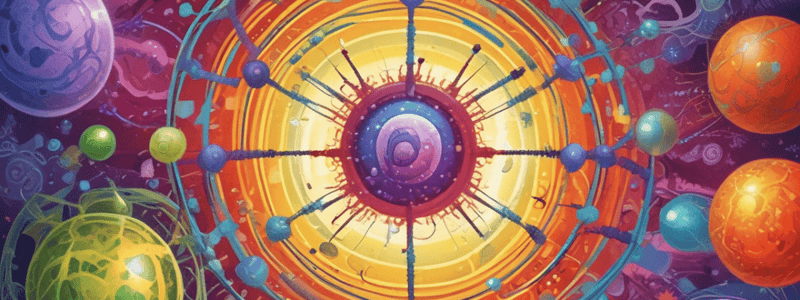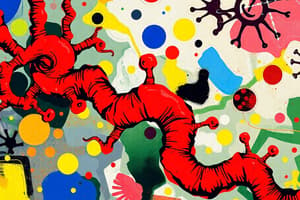Podcast
Questions and Answers
What is immunology?
What is immunology?
The study of immune responses - of the cellular and molecular events that occur after an organism encounters microbes and other foreign macromolecules.
What is the historical origin of the term 'immunity'?
What is the historical origin of the term 'immunity'?
Derived from the Latin word immunitas, which originally meant protection from legal prosecution offered to Roman senators during their tenures in office.
What is the immune system?
What is the immune system?
The cells and molecules responsible for immunity, collectively constituting the immune system.
What is the immune response?
What is the immune response?
What is the physiological function of the immune system?
What is the physiological function of the immune system?
What is the most effective means of controlling infectious diseases?
What is the most effective means of controlling infectious diseases?
Give an example of an autoimmune disease induced by dysregulated immune systems.
Give an example of an autoimmune disease induced by dysregulated immune systems.
What type of immunity is mediated by the early reactions of innate immunity and the later responses of adaptive immunity?
What type of immunity is mediated by the early reactions of innate immunity and the later responses of adaptive immunity?
What type of immunity is specific for different microbial and nonmicrobial antigens?
What type of immunity is specific for different microbial and nonmicrobial antigens?
How is adaptive immunity enhanced?
How is adaptive immunity enhanced?
Why is understanding adaptive immune responses important?
Why is understanding adaptive immune responses important?
Why are an4gen receptors considered clonally distributed in T and B cells?
Why are an4gen receptors considered clonally distributed in T and B cells?
What is the role of B lymphocytes in humoral immunity?
What is the role of B lymphocytes in humoral immunity?
What are the cardinal features of adaptive immune responses?
What are the cardinal features of adaptive immune responses?
What is the main reason why secondary immune responses are typically stronger than primary immune responses?
What is the main reason why secondary immune responses are typically stronger than primary immune responses?
How do helper T lymphocytes contribute to cell-mediated immunity?
How do helper T lymphocytes contribute to cell-mediated immunity?
Where do lymphocytes develop from precursors?
Where do lymphocytes develop from precursors?
How does immunologic memory contribute to combating infections by prevalent microbes?
How does immunologic memory contribute to combating infections by prevalent microbes?
What is the main function of cytotoxic T lymphocytes in the immune response?
What is the main function of cytotoxic T lymphocytes in the immune response?
Explain why memory responses to the same antigen are usually more rapid and greater in magnitude.
Explain why memory responses to the same antigen are usually more rapid and greater in magnitude.
What is the significance of an4gens X and Y inducing the production of different antibodies?
What is the significance of an4gens X and Y inducing the production of different antibodies?
What defines the two types of adaptive immunity mentioned in the text?
What defines the two types of adaptive immunity mentioned in the text?
Where do B lymphocytes and T lymphocytes originate and mature?
Where do B lymphocytes and T lymphocytes originate and mature?
What are the two major subsets of lymphocytes and how do they differ?
What are the two major subsets of lymphocytes and how do they differ?
Describe the process by which the adaptive immune response is initiated.
Describe the process by which the adaptive immune response is initiated.
What is the role of specialized APCs in the adaptive immune response?
What is the role of specialized APCs in the adaptive immune response?
Explain the function of effector cells in the adaptive immune response.
Explain the function of effector cells in the adaptive immune response.
How does memory cell function differ from that of effector cells in the immune response?
How does memory cell function differ from that of effector cells in the immune response?
What is the mechanism of defense against extracellular microbes in the immune system?
What is the mechanism of defense against extracellular microbes in the immune system?
Flashcards are hidden until you start studying




